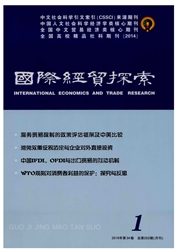

 中文摘要:
中文摘要:
2012年10月,日本成为第一个也是迄今唯一一个正式批准ACTA的国家。然而.ACTA在欧盟却遭到强烈抵制,欧洲议会于2012年7月否决了该协定,令ACTA前景堪忧,发达国家推动ACTA的动机源于对知识产权国际保护现状的不满和对TRIPS等多边体系的失望.CAACTA为代表的知识产权诸边协定成为发达国家寻找新的知识产权谈判桌的两大努力方向之一。ACTA的反对者.除了发展中国家这一传统力量外.近年来在发达国家内部出现的反对知识产权强保护的新兴力量在抵制ACTA的运动中扮演了关键角色。ACTA的未来走向,取决于各方的利益博弈和力量消长,在ACTA的应对上,我国应当展示一定的灵活性,以维护现行多边体系的有效性和我们的话语权。
 英文摘要:
英文摘要:
In October 2012, Japan became the first and only country which officially approved ACTA. However, ACTA encountered strong resistance in European Union, so that European Parliament overruled this agreement in July, 2012. The motive of the developed countries to impel ACTA is that they are dissatisfied with the recent situation of IPR protection in the world and are disappointed with IPR multilateral system such as TRIPS. As a result, the developed countries begin to seek new bargaining tables on IPR, and the plurilateral agreement represented by ACTA is one of their two great efforts. In terms of the opponents of ACTA, besides the developing nation as a traditional force, in the developed countries appears a new force which resists IPR in recent years and has acted as a key role in the movement of resisting ACTA. The future trend of ACTA will be determined by benefit gambling and the change of all kinds of strength. In response to ACTA, China should demonstrate certain flexibility in order to maintain the validity of multilateral systems and our influence.
 同期刊论文项目
同期刊论文项目
 同项目期刊论文
同项目期刊论文
 期刊信息
期刊信息
